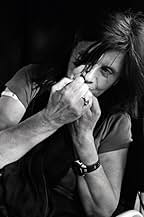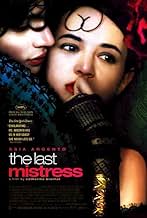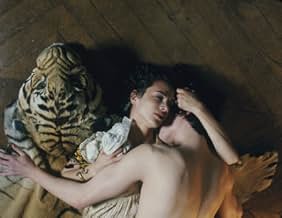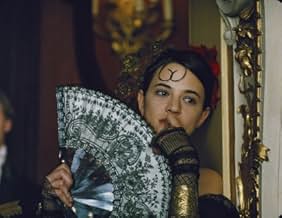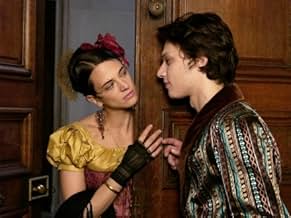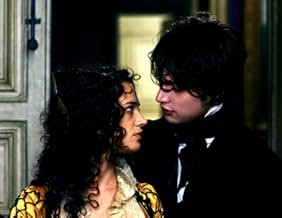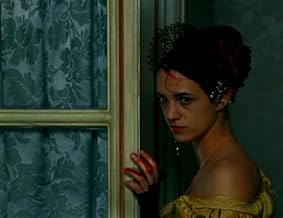Une vieille maîtresse
- 2007
- Tous publics
- 1h 49m
IMDb RATING
6.2/10
3.9K
YOUR RATING
Secrets, rumors and betrayals surround the upcoming marriage between a young dissolute man and virtuous woman of the French aristocracy.Secrets, rumors and betrayals surround the upcoming marriage between a young dissolute man and virtuous woman of the French aristocracy.Secrets, rumors and betrayals surround the upcoming marriage between a young dissolute man and virtuous woman of the French aristocracy.
- Director
- Writers
- Stars
- Awards
- 3 nominations total
- Director
- Writers
- All cast & crew
- Production, box office & more at IMDbPro
Featured reviews
The Last Mistress, a film by Catherine Breillat, director of the hot-n-sexy (and probably X-rated if released in the 1970s) Romance, deals with the torn and frayed and wretched relationship between Vellini (Asia Argento), and Ryno de Marigny (first timer Fu'ad Ait Aattou), and how Ryno's mistress threatens his marriage to Hermandarde (Roxane Mesquida), granddaughter of a tough but very fair and reasonable old matriarch. Breillat's direction of the story, which is mostly told in flashback as the grandmother of her soon-to-be-grandson-in-law tells all about his very turbulent bond with Vellini, is sometimes a little dull and stodgy, and it drags in spots that it really should pick up in high gear.
But damn it all if it's not some absorbing times in the midst of a classic period setting among character we can relish in. Granted, Breillat likely cast Aattou for constantly having a 'sexy-man' look (somewhat akin, if you ask me, of a young Mick Jagger with ridiculously striking eyes and big lips). Argento, on the other hand, is cast perfectly, and for every bit that Aatou and Mesquida don't quite connect as husband and wife it's made up for by the total, hot connection between the real two leads. Argento is right at home with this twisted, damaged but alive and easily emotional creature, who has that tendency in French melodramas for tragedy at any moment just to get a rise. But she's also tender in surprising moments, and lets her soul bare completely in rough sex scenes (the craziest set in the desert following a very sudden death of a character), which par for Breillat are go-for-broke.
What the film may lack in really being a fully "modern" work- it feels like a lot of it is so stuck in the period novel setting that it's locked away, which maybe was the right choice- it's made up for by the stars' appeal and the drive of the torrid love affair that just won't go away. It's appealing, boring, and highly charged in equal measure.
But damn it all if it's not some absorbing times in the midst of a classic period setting among character we can relish in. Granted, Breillat likely cast Aattou for constantly having a 'sexy-man' look (somewhat akin, if you ask me, of a young Mick Jagger with ridiculously striking eyes and big lips). Argento, on the other hand, is cast perfectly, and for every bit that Aatou and Mesquida don't quite connect as husband and wife it's made up for by the total, hot connection between the real two leads. Argento is right at home with this twisted, damaged but alive and easily emotional creature, who has that tendency in French melodramas for tragedy at any moment just to get a rise. But she's also tender in surprising moments, and lets her soul bare completely in rough sex scenes (the craziest set in the desert following a very sudden death of a character), which par for Breillat are go-for-broke.
What the film may lack in really being a fully "modern" work- it feels like a lot of it is so stuck in the period novel setting that it's locked away, which maybe was the right choice- it's made up for by the stars' appeal and the drive of the torrid love affair that just won't go away. It's appealing, boring, and highly charged in equal measure.
Une vieille maîtresse – The Last Mistress – CATCH IT (B) Based upon controversial French novel "Une vieille maîtresse/An old Mistress" by Jules Amédée Barbey d'Aurevilly. Just like most of the French movies The Last Mistress doesn't hesitate from sex, seduction and brutality of love. It's a story about a young rich French Ryno de Marigny who is ready to get married into a Nobel family. Just before getting married he confronts in front of his future rich wife's grandmother about his last old mistress of 10 years. The movie unfolds how Ryno falls head over heels for an older married woman, who is not even pretty or graceful. It's the rawness which attracts Ryno towards her, whom he first called an ugly nut. Fu'ad Aït Aattou a newcomer played Ryno with utmost honesty. He is divine and his falling for an Asia Argento's ambiguous character is questionable. But that's the whole point of love, lust and seduction when two unlikely people meet and ruin everything around them along with each other. Asia Argento is amazing, even though I saw her first in Marie Antoinette as French king's crazy mistress raised question of her action ability because she acted the same as she acted here. If I ignore that she was in tedious Marie Antoinette and Une vieille maîtresse release long before atrocious Marie Antoneitte. I actually loved her performance. There are many few actresses who can let them emotionally and physically open like that. You forget that it's the part of an act as it looks reality. Fu'ad Aït Aattou and Asia Argento's chemistry makes this a memorable venture. The long sex confrontation scenes are the proof how involved they are with the subject. Roxane Mesquida as Ryno's wife is stunning as always. Une vieille maîtresse is a controversial tale of lust, love and seduction. Overall, I enjoyed the movie even though I wanted the characters to be smart not so naïve and stupid, lost in sex, lust and seduction.
Although I've seen several of them now, I still don't know if I actually LIKE Catherine Breillat films. Her films are a strange contradiction: On one hand, they contain a lot of pretty graphic sex and always feature some of the most attractive actresses in Europe (and this one with Asia Argento and Roxanne Mesquia is certainly no exception). On the other though, they are often very depressing and told with such a harsh feminist bent that they probably make most people (well, most men anyway)feel more like castrating themselves than getting turned on. ( I actually haven't even seen her most notorious film, "Fat Girl", but after the truly depressing experience that was the supposedly very similar "36 Fillete" I've never wanted to).
You would expect then given Breillat's typical misanthropic bent that when she made a French costume drama like this one, the liaisons would be even more dangerous and the intentions even crueler. This is actually a surprisingly soft-hearted film though where all the main characters are pretty likable and sympathetic (at least in some ways). The only typically harsh Breillat touch is a couple having frenzied sex next to the funeral pyre of their dead daughter. The basic story involves a handsome young rake, who is about to marry a beautiful young heiress (Mesquia) with the blessing of her jaded-but-wise grandmother (who, since this is set in 1835, is herself a battle-scarred veteran of the original pre-revolutionary "dangerous liaison" era). He is unable to give up his long-time mistress, however, a social-climbing Spanish divorcée (Argento) with whom he has had a passionate ten year love-hate relationship. All the acting is very good and the characters believable (although you do have to wonder why a 19th Spanish noblewoman would have a tattoo on her butt). My only real complaint was that it was about a half an hour too long and the climax was pretty anti-climactic.
If you like either French costume dramas or typical Catherine Breillat films, you may or may not like this, since it ends being very different than either. It's not too bad though.
You would expect then given Breillat's typical misanthropic bent that when she made a French costume drama like this one, the liaisons would be even more dangerous and the intentions even crueler. This is actually a surprisingly soft-hearted film though where all the main characters are pretty likable and sympathetic (at least in some ways). The only typically harsh Breillat touch is a couple having frenzied sex next to the funeral pyre of their dead daughter. The basic story involves a handsome young rake, who is about to marry a beautiful young heiress (Mesquia) with the blessing of her jaded-but-wise grandmother (who, since this is set in 1835, is herself a battle-scarred veteran of the original pre-revolutionary "dangerous liaison" era). He is unable to give up his long-time mistress, however, a social-climbing Spanish divorcée (Argento) with whom he has had a passionate ten year love-hate relationship. All the acting is very good and the characters believable (although you do have to wonder why a 19th Spanish noblewoman would have a tattoo on her butt). My only real complaint was that it was about a half an hour too long and the climax was pretty anti-climactic.
If you like either French costume dramas or typical Catherine Breillat films, you may or may not like this, since it ends being very different than either. It's not too bad though.
This is a beautiful period film with a lot of Breillat's trademark unflinching look at love and war between sexes. The story is old, but this is first time I see it put so frankly - they not marrying the the love of their life....
Sex is shot amazingly. There is an eyeful of historical detail and actors are looking great, dressed and undressed. The book it is based on according to Breillat, is autobiographical, which makes it even more interesting.
To put it simply - great work in many aspects.
Bravo again Catherine!
Sex is shot amazingly. There is an eyeful of historical detail and actors are looking great, dressed and undressed. The book it is based on according to Breillat, is autobiographical, which makes it even more interesting.
To put it simply - great work in many aspects.
Bravo again Catherine!
Milan Kundera writes: "Human time does not turn in a circle; it runs ahead in a straight line. That is why man cannot be happy: happiness is the longing for repetition." Case in point, Ryno de Marigny (Fu'ad Ait Aattou), an impoverished but elegantly handsome young man who is trapped between the aristocratic world to which he aspires, and an obsessive bond with a defiantly independent mistress, the boldly seductive Vellini (Asia Argento), an older but dazzling Spanish woman said to be born of an Italian noblewoman and a bullfighter. Adapted from a 19th-century novel Une vieille maîtresse by Jules-Amédée Barbey d'Aurevilly, Catherine Breillat's beautiful and elegant The Last Mistress, challenges the patriarchal assumptions of the age by depicting a 36-year old woman's right to fully express her sexual desires even if it is means flaunting society's conventions and Christian misogynist teachings.
Set in Paris in 1835, complete with elaborate period costumes and sumptuously decorated drawing rooms, the film opens with the gossip between two aging aristocrats, the Vicomte de Prony (Michael Lonsdale) and his wife, the Countess d'Artelles (Yolande Moreau about the ten-year affair between de Marigny and Vellini and the young man's impending marriage to the wealthy Hermangarde (Roxane Mesquida). Hermangarde's grandmother La marquise de Flers, excellently played by the 80-year-old French writer Claude Sarrate, is an open-minded and rational individual who claims to be a woman of the 18th century. Worried that Ryno will not be able to get over his passion for his fiery Spanish mistress, de Flers listens attentively as Ryno relates to her the details of his long relationship, an affair that he says has now come to an end, telling her that "You don't betray a new love with an old mistress".
In flashback, Ryno relates how he was overcome by Vellini's wild beauty after they were introduced at a party ten years before. Vellini, then married to a wealthy but dull Englishman, reacts negatively, however, when she overhears Ryno call her an ugly mutt and the young man is forced to vigorously pursue her despite her strong objections, forcing her to kiss him while the two are out riding. Her horrified husband witnesses the act and challenges Ryno to a duel the next morning. After deliberately missing his first shot, Ryno is shot in the chest, a wound from which he will take months to recover. The incident, however, triggers Vellini's awareness of her love for Ryno, exotically announced by her sucking the blood from the gaping hole in his chest.
De Flers presses Ryno for the details of their life together during the past ten years but the dramatic story is better left for the viewer to discover. When the film returns to present time, de Marigny and Hermangarde are married and ostensibly in love, yet he struggles to keep his word to her grandmother by moving away from the temptations of Paris to a remote seacoast. The cigar-smoking temptress, however, also loves the fresh sea air and the stage is set for the film's final act. The Last Mistress is an outstanding work of art that is strengthened immeasurably by striking performances by Asia Argento and first-time actor Fu'ad Ait Aattou. Argento fully captures Vellini's sexual assertiveness but tempers her incendiary disposition with naturalism and a tenderness that makes us care about her fate.
Aattou, discovered by Breillat in a crowded café, is almost feminine in appearance with overly thick lips and sensitive eyes, yet he brings a masculine determination to the role that makes him completely convincing. Like the recent film by Jacques Rivette, The Duchess of Langeais, in The Last Mistress love becomes a contest of wills, a power struggle between two people whose relationship consists of a tug of war not only between domination and submission but between 18th and 19th century social codes. That Breillat makes the ride so entrancing is a tribute to her enormous talent.
Set in Paris in 1835, complete with elaborate period costumes and sumptuously decorated drawing rooms, the film opens with the gossip between two aging aristocrats, the Vicomte de Prony (Michael Lonsdale) and his wife, the Countess d'Artelles (Yolande Moreau about the ten-year affair between de Marigny and Vellini and the young man's impending marriage to the wealthy Hermangarde (Roxane Mesquida). Hermangarde's grandmother La marquise de Flers, excellently played by the 80-year-old French writer Claude Sarrate, is an open-minded and rational individual who claims to be a woman of the 18th century. Worried that Ryno will not be able to get over his passion for his fiery Spanish mistress, de Flers listens attentively as Ryno relates to her the details of his long relationship, an affair that he says has now come to an end, telling her that "You don't betray a new love with an old mistress".
In flashback, Ryno relates how he was overcome by Vellini's wild beauty after they were introduced at a party ten years before. Vellini, then married to a wealthy but dull Englishman, reacts negatively, however, when she overhears Ryno call her an ugly mutt and the young man is forced to vigorously pursue her despite her strong objections, forcing her to kiss him while the two are out riding. Her horrified husband witnesses the act and challenges Ryno to a duel the next morning. After deliberately missing his first shot, Ryno is shot in the chest, a wound from which he will take months to recover. The incident, however, triggers Vellini's awareness of her love for Ryno, exotically announced by her sucking the blood from the gaping hole in his chest.
De Flers presses Ryno for the details of their life together during the past ten years but the dramatic story is better left for the viewer to discover. When the film returns to present time, de Marigny and Hermangarde are married and ostensibly in love, yet he struggles to keep his word to her grandmother by moving away from the temptations of Paris to a remote seacoast. The cigar-smoking temptress, however, also loves the fresh sea air and the stage is set for the film's final act. The Last Mistress is an outstanding work of art that is strengthened immeasurably by striking performances by Asia Argento and first-time actor Fu'ad Ait Aattou. Argento fully captures Vellini's sexual assertiveness but tempers her incendiary disposition with naturalism and a tenderness that makes us care about her fate.
Aattou, discovered by Breillat in a crowded café, is almost feminine in appearance with overly thick lips and sensitive eyes, yet he brings a masculine determination to the role that makes him completely convincing. Like the recent film by Jacques Rivette, The Duchess of Langeais, in The Last Mistress love becomes a contest of wills, a power struggle between two people whose relationship consists of a tug of war not only between domination and submission but between 18th and 19th century social codes. That Breillat makes the ride so entrancing is a tribute to her enormous talent.
Did you know
- TriviaCatherine Breillat discovered Fu'ad Aït Aattou in a Paris café.
- GoofsWhile Ryno is descending the stairs at the opera, an Edgar Degas mural can be seen. Degas would have only just been born in this era.
- ConnectionsFeatured in Metropolis: Cannes 2007 - Special (2007)
Details
- Release date
- Countries of origin
- Languages
- Also known as
- The Last Mistress
- Filming locations
- Île de Bréhat, Côtes-d'Armor, France(Moulin du Birlot: Vellini's house in Brittany)
- Production companies
- See more company credits at IMDbPro
Box office
- Budget
- $6,000,000 (estimated)
- Gross US & Canada
- $785,671
- Opening weekend US & Canada
- $33,554
- Jun 29, 2008
- Gross worldwide
- $1,831,577
- Runtime
- 1h 49m(109 min)
- Color
- Sound mix
- Aspect ratio
- 1.85 : 1
Contribute to this page
Suggest an edit or add missing content


